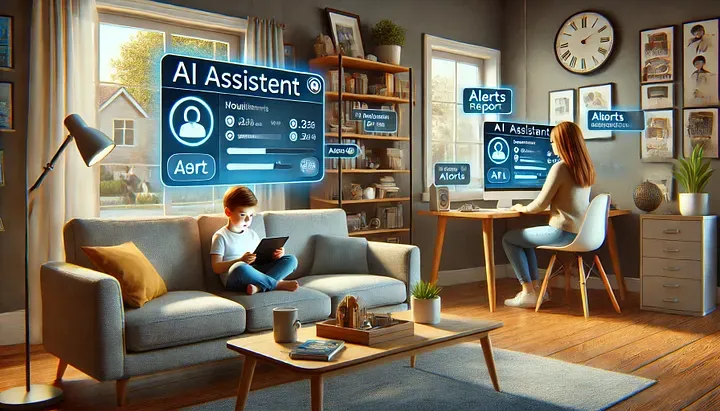Using AI Assistants to Safeguard Children on Social Media

In today’s digital age, social media platforms such as TikTok, Instagram, and Facebook have become integral parts of daily life, especially for children and adolescents. While these platforms offer numerous benefits, they pose significant risks. Exposure to inappropriate content, cyberbullying, and interaction with malicious actors are growing concerns for parents. Relying on social media companies to regulate and protect young users often proves ineffective, as these measures conflict with their financial interests. However, an AI assistant residing natively on phones and PCs presents a promising solution. By collaborating with parents, these assistants can create a safer online environment for children, providing parents with a sense of security.
AI assistants can be a source of relief for parents, as they play a critical role in monitoring and managing children’s social media use. By integrating advanced machine learning algorithms and natural language processing, these assistants can analyze the content children are exposed to and interact with in real time. They can identify inappropriate or harmful content, flagging or blocking it before the child views it. This proactive approach significantly reduces the risk of children encountering dangerous material online, providing parents with a sense of reassurance.
Moreover, AI assistants can track children’s online behavior patterns, identifying potential red flags such as excessive use, engagement with harmful communities, or signs of cyberbullying. By recognizing these patterns early, AI can alert parents to possible issues, allowing them to intervene before problems escalate.
AI assistants can empower parents by giving them detailed insights and control over their children’s social media use. For instance, parents can set up filters and restrictions tailored to their child’s age and maturity level. The AI assistant can enforce these restrictions, ensuring children only access age-appropriate content. This level of control and responsibility can make parents feel more empowered in managing their child’s digital life.
AI assistants can facilitate open communication between parents and children. AI can help parents discuss online safety and appropriate behavior with their children by providing conversation starters or highlighting specific concerns. This proactive engagement fosters a safer online environment and educates children about responsible social media use.
One of the key advantages of AI assistants is their ability to operate natively on devices, minimizing the need for data to be sent to external servers. This local processing ensures that children’s data remains private and secure, addressing a significant concern for parents. The AI assistant can anonymize data and only share essential information with parents, further enhancing privacy while still providing valuable insights.
AI assistants can implement robust security measures to protect children from cyber threats. They can detect phishing attempts, malware, and other online dangers, alerting the child and the parent. By continuously updating their threat detection algorithms, AI assistants can stay ahead of emerging risks, offering additional protection.
In addition to safeguarding children from harmful content, AI assistants can promote healthy digital habits. They can encourage regular breaks, suggest alternative activities, and set time limits on social media use. AI assistants help children develop healthier relationships with their devices by fostering a balanced approach to technology.
AI can provide educational content and resources, turning screen time into a more productive experience. AI assistants can support children’s academic growth and development by integrating with educational platforms and offering personalized learning recommendations.
While the potential benefits of AI assistants in protecting children online are significant, ethical considerations must be addressed. Ensuring transparency in how AI monitors and manages children’s online activity is essential. Parents should have full control over the settings and data, and children should be informed about the role of AI in their digital lives.
AI developers must prioritize bias-free algorithms to ensure all users’ fair and equitable treatment. These systems must also be continuously monitored and updated to maintain their effectiveness and ethical integrity.
As social media continues to permeate the lives of younger generations, the need for effective safeguards becomes increasingly urgent. AI assistants, residing natively on phones and PCs, offer a powerful tool for parents to protect their children from online dangers. By monitoring content, enhancing parental control, ensuring privacy, promoting healthy habits, and addressing ethical considerations, AI can collaborate with parents to create a safer and more positive digital environment for children. Through this partnership, we can better navigate the complexities of the digital age, ensuring that our children grow up with the benefits of technology while minimizing its risks.
Join Us Towards a Greater Understanding of AI
By following us and sharing our content, you’re not just spreading awareness but also playing a crucial role in demystifying AI. Your insights, questions, and suggestions make this community vibrant and engaging. We’re eager to hear your thoughts on topics you’re curious about or wish to delve deeper into. Together, we can make AI accessible and engaging for everyone. Let’s continue this journey towards a better understanding of AI. Please share your thoughts with us via email: marty@bearnetai.com, and don’t forget to follow and share BearNetAI with others who might also benefit from it. Your support makes all the difference.
Thank you for being a part of this fascinating journey.
BearNetAI. From Bytes to Insights. AI Simplified.
Categories: Artificial Intelligence (AI), Technology and Society, Parenting and Child Safety, Cyber Security and Privacy, Digital Literacy and Education
The following sources are cited as references used in research for this BLOG post:
It’s Complicated: The Social Lives of Networked Teens by Danah Boyd
Artificial Intelligence: A Guide for Thinking Humans by Melanie Mitchell
Raising Humans in a Digital World: Helping Kids Build a Healthy Relationship with Technology by Diana Graber
The Big Disconnect: Protecting Childhood and Family Relationships in the Digital Age by Catherine Steiner-Adair and Teresa H. Barker
Parenting in the Age of Attention Snatchers: A Step-by-Step Guide to Balancing Your Child’s Use of Technology by Lucy Jo Palladino
Ethics of Artificial Intelligence and Robotics edited by Vincent C. Müller
© 2024 BearNetAI LLC